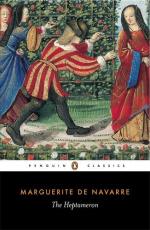“By this story, ladies, you may see how, by the subtlety of a man, an old woman was deceived and the honour of a young one saved. Any one who would give the names, or had seen the merchant’s face and the consternation of the old woman, would have a very tender conscience to hold from laughing. It is sufficient for me to prove to you by this story that a man’s wit is as prompt and as helpful at a pinch as a woman’s, and thus to show you, ladies, that you need not fear to fall into men’s hands. If your own wit should fail you, you will find theirs prepared to shield your honour.”
“In truth, Hircan,” said Longarine, “I grant that the tale is a very pleasant one and the wit great, but the example is not such as maids should follow. I readily believe there are some whom you would fain have approve it, but you are not so foolish as to wish that your wife, or her whose honour you set higher than her pleasure,(1) should play such a game. I believe there is none who would watch them more closely or shield them more readily than you.”
1 M. Frank, adopting the generally received opinion that Hircan is King Henry of Navarre, believes this to be an allusion to one of the King’s sisters—Ann, who married the Count of Estrac, or Isabel, who married M. de Rohan—but it is more likely that Henry’s daughter, Jane d’Albret, is the person referred to.—Ed.
“By my conscience,” said Hircan, “if she whom you mention had done such a thing, and I knew nothing about it, I should think none the less of her. For all I know, some one may have played as good a trick on me; however, knowing nothing, I am unconcerned.”
At this Parlamente could not refrain from saying—
“A wicked man cannot but be suspicious; happy are those who give no occasion for suspicion.”
“I have never seen a great fire from which there came no smoke,” said Longarine, “but I have often seen smoke where there was no fire. The wicked are as suspicious when there is no mischief as when there is.”
“Truly, Longarine,” Hircan forthwith rejoined, “you have spoken so well in support of the honour of ladies wrongfully suspected, that I give you my vote to tell the eighth tale. I hope, however, that you will not make us weep, as Madame Oisille did, by too much praise of virtuous women.”
At this Longarine laughed heartily, and thus began:—“You want me to make you laugh, as is my wont, but it shall not be at women’s expense. I will show you, however, how easy it is to deceive them when they are inclined to be jealous and esteem themselves clever enough to deceive their husbands.”
[Illustration: 113.jpg Tailpiece]
APPENDIX.
A. (Prologue, Page 31.)
The dedication with which Anthony Le Macon prefaces his translation of Boccaccio contains several curious passages. In it Margaret is styled “the most high and most illustrious Princess Margaret of France, only sister of the King, Queen of Navarre, Duchess of Alencon and of Berry;” while the author describes himself as “Master Anthoine Le Macon, Councillor of the King, Receiver General of his finances in Burgundy, and very humble secretary to this Queen.” He then proceeds to say:—




